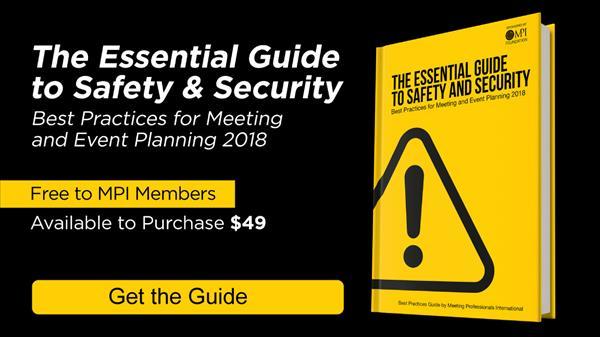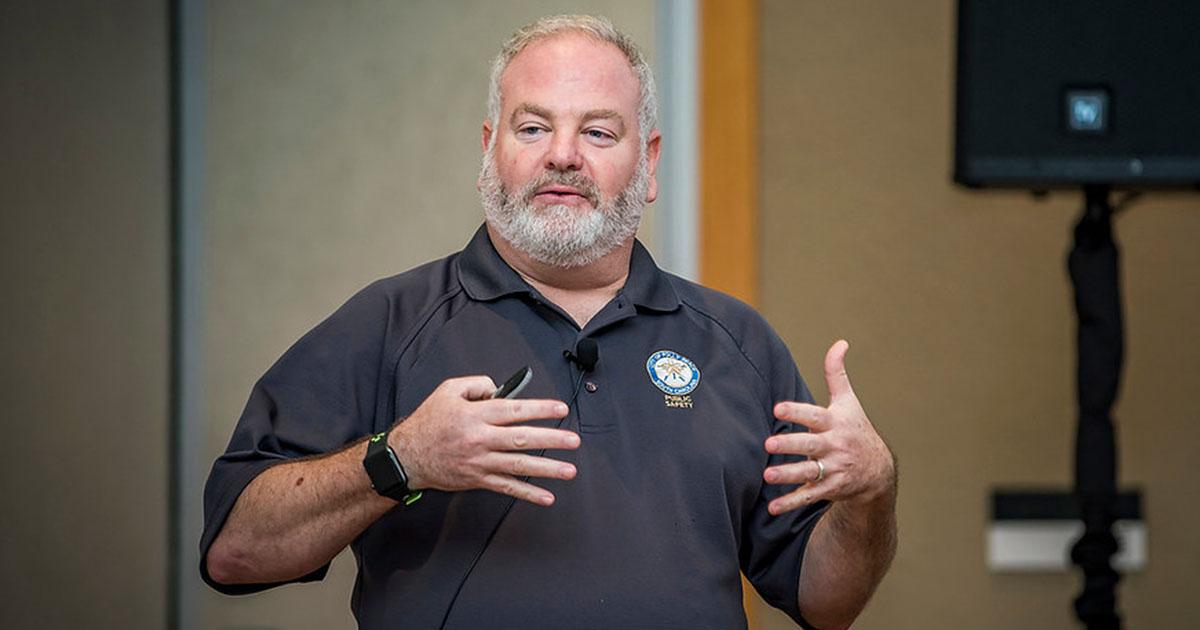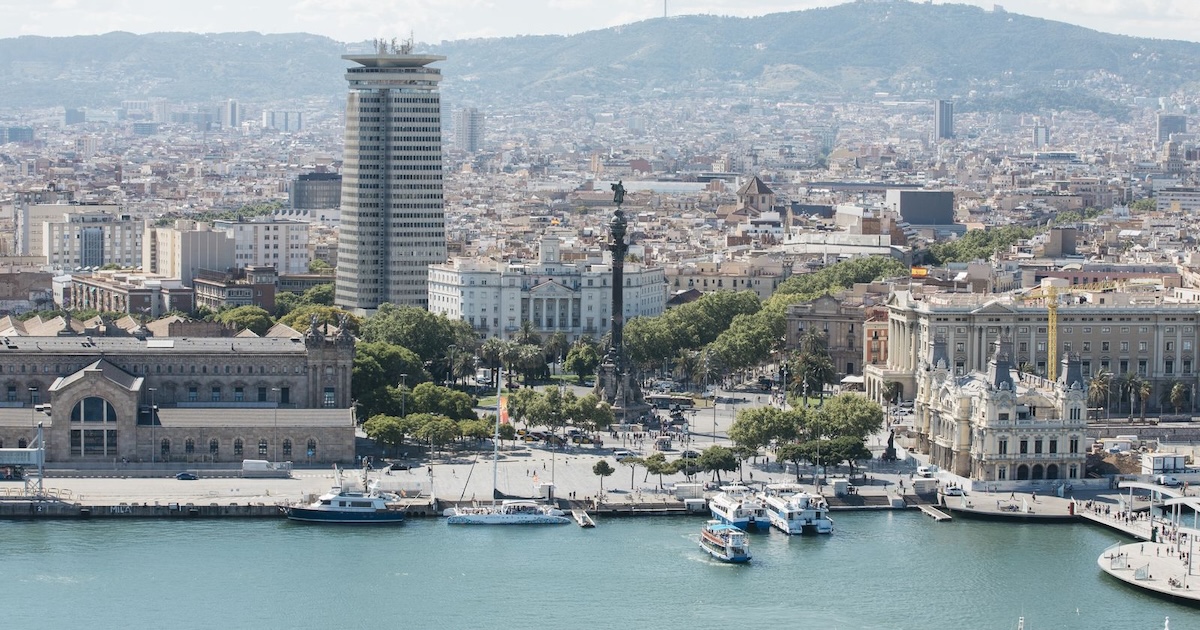Photo courtesy of SPIN/Josh Power Photography
Download The Event Safety & Security Guide
With decades of experience in both law enforcement and meeting management, Alan Kleinfeld, CMP, CMM, MTA (MPI Carolinas Chapter), sees a definite trend in what planners want in terms of safety and security education.
They want to learn how to prepare themselves for something of a doomsday scenario: What do they do if an active shooter invades their event or if a hurricane or massive fire or other catastrophe occurs on their watch?
“I tell my groups that they are far more likely to have something happen like an attendee tripping and falling at one of their events than they are to have something like an active shooter incident,” says Kleinfeld, director of emergency planning for Charleston, S.C.-based Arrive Conference Solutions and a frequent speaker to groups of meeting professionals (including at the MPI World Education Congress in June). “But in part because of the incidence of public violence that people are seeing on their televisions these days, planners want to know how to prepsare themselves to be ready if the worst happens. So I teach that as well as the basics of handling the everyday stuff.”
Because meeting and event planners have a desire these days to be trained and prepared for every safety and security scenario,vi an additional challenge presents itself: What they will need to learn is extensive enough to be a bit daunting, he says. (MPI has rolled out an array of education options for meeting professionals, ranging from certificate programs in risk management to a newly released, comprehensive guidebook).
The good news is that planners don’t need to stress themselves out with the idea of becoming fully knowledgeable overnight, Kleinfeld says.

“What planners have to realize is that they don’t have to deal with all of it at once,” he says. “They would be well served by just picking a starting point. It’s kind of like starting an exercise program. You don’t want to hit the gym every day for two or three hours because you’re going to just burn yourself out. It will become boring or it will become painful, and you will not have accomplished much. Kind of the same thing can be said about educating yourself about safety and security.”
In his training sessions for beginners, Kleinfeld emphasizes simply learning some basics that offer a firm foundation by which planners will always be thinking about safety and security measures to build into the fabric of every event they plan.
“There are a couple of simple things planners can do without having to actually create a detailed emergency action plan, without having to stress out about having too many safety worries,” he says. “One of the things I talk about in almost every sessions is trying to get everybody to start thinking about safety as part of the meeting planning mindset. I don’t want them to think about it as an extra chore or more work.”
Meeting professionals will learn to do the basics of safety and security through repetition—the more they practice putting those fundamentals into their events, the more instinctive it will be to do it every time, he says.
Among the simple basics that Kleinfeld teaches is the prudent and judicious use of calling 911 for help when something happens at an event. It not only serves to mitigate liability in the case of something such as a personal injury to one of the attendees, but also does another very important thing: gets expert help to the situation very quickly.
He emphasizes that planners should not be hesitant to call 911 because of fear that they will be calling help when it isn’t need.
“In my opinion, if you are sitting there even asking yourself, ‘Should I call 911 because of what has just happened?’ that means you should call 911,” Kleinfeld says.
Kleinfeld, who spent a decade as a reserve officer for a Washington D.C. area police department and now has a paid position as a limited duty officer with the Folly Beach, S.C., police department, says that first responders to 911 calls—emergency medical technicians, police, firefighters and others—do not resent going out on calls where no one ends up going to the hospital. He said in his jurisdiction—a beach town near Charleston, S.C.—911 gets called to the beach area several times a day on average in summer months, and more often than not no one gets taken to the hospital or arrested, and no fire is extinguished.
“First responders come because it’s their job and they are eager to do that job,” he says.
In the case of first responders coming because there is a question about someone being injured or suffering a malady such as a heart attack, the person in question gets a medical evaluation from experts, and if that person doesn’t need medical services no one within the system is offended. Of course, if the person in question has actually suffered something such as a heart attack, their chances of surviving are radically increased. And if the person receiving help from first responders declines to go to the hospital, in many jurisdictions that’s his or her right, and the person will be asked to sign a waiver declining medical treatment, creating still more liability mitigation for the planner and the venue should something go wrong later.
One caveat that Kleinfeld offers is that in many venues, particularly hotels, there is a different number to call in emergencies other than 911, often an extension on the in-house telephone system that will contact staff that’s already on site (and the staff person at the facility may call 911 as well). Finding out the correct calling procedure for a venue is one of the first things a planner should do upon arrival at that venue, he says.
The person making the call to 911 should already be aware of the immediate information to provide.
“You should be able to essentially say, ‘I’m at 123 Main Street and a person here has fallen and needs help.’ Then you should say. ‘I’ll stay on the line now while you go ahead and dispatch first responders.’ That facilitates getting help to your location faster.”
Kleinfeld had an event at which he was the person who called 911 when an attendee collapsed and was non-responsive.
“It seemed like forever from the time I called 911 until help arrived, but in fact it was nine minutes until the EMTs were attending the gentleman who had fallen.”
The man died, but Kleinfeld says there was a certain peace of mind that came from calling 911 the instant the man fell.
Other basics that Kleinfeld urges planners to start practicing include the following.
Create an evacuation plan for every room in which an event is held. Start by noting the location of all exit doors, electrical outlets and the house phone. When the audiovisual system is being set up, make sure that any cables running across the floor are taped down so that no one will trip over them. It’s simple stuff, but can prove very useful in case of an emergency. Doing this little inventory of every room can serve to make it a habit.
Check with venue staff about: how far it is to the nearest hospital, what law enforcement jurisdiction you’re in and which police or sheriff’s department should be called in case of emergency. It’s also worthwhile to ask the venue or the CVB what other events will be going on concurrently. Is there a marathon run or a parade that might be blocking streets during your event and therefore require tweaking one’s emergency evacuation routes in case something such as a flood occurs?
Ask to see the venue’s own emergency plan. Kleinfeld says it’s unlikely that a hotel will be willing to let you have a copy or read their in-house emergency plan.
“But it's very important that you ask every hotel if you can see it, so you will at least know if they have one or not,” he says. “You can’t just assume that they do.”
If the hotel doesn’t show you its emergency plan that may be because they feel it’s proprietary and don’t want their competitors to learn the specifics and steal some of their ideas and procedures, or that they don’t won’t their plan to fall into the hands of "bad guys" with ill intent.. But if you ask the hotel to see their emergency plan and they decline, that hotel will then be likely to help you make your own emergency plan for your event at their venue, and you will be tapping into their expertise and knowledge about the venue itself. Kleinfeld says the hotel would also be likely to introduce you to its security staff, which becomes a valuable resource in your safety and security planning for your event in their venue.
Learn Event Security Best Practices Through MPI
According to recent studies, 53 percent of meeting and event organizers don’t have event-specific crisis management plans in place. The MPI Essential Guide to Safety and Security provides nearly 400 recommendations for safety and security best practices for meeting and events and may be adapted for meetings large or small. The guide costs US$49, but is free for MPI members. Learn more at mpi.org/tools/meeting-and-event-safety-and-security.
The MPI Academy offers a variety of safety and security-related learning opportunities, from certificate programs to on-demand webinars. Certificate programs that will make your resume stand out, keep your skills sharp and keep your mind sharper. Components include “Emergency Preparedness for Meetings and Events” and “Crisis Communications.” Those attending IMEX America in Las Vegas will have the opportunity to earn the Crisis Communications certificate on Oct. 15 (https://tinyurl.com/crisiscomm18). Find out more about all opportunities at academy.mpiweb.org.







